Leopoldine Konstantin (1886-1965) was a famous Austrian theatre and film character actress, who worked for years with director Max Reinhardt. She played Claude Rains' dominant mother in Alfred Hitchcock’s classic Notorious (1946). It was her sole Hollywood role.
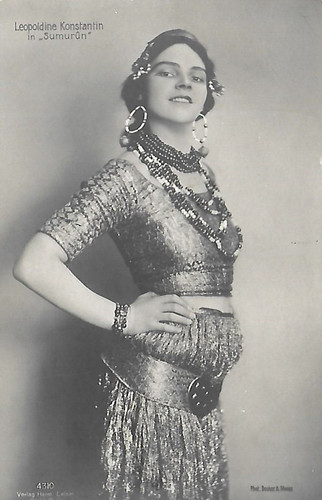
German postcard by Verlag Hermann Leiser, no. 4310. Photo: Becker & Maass. Collection: Didier Hanson. Publicity still for Sumurûn (Max Reinhardt, 1910).
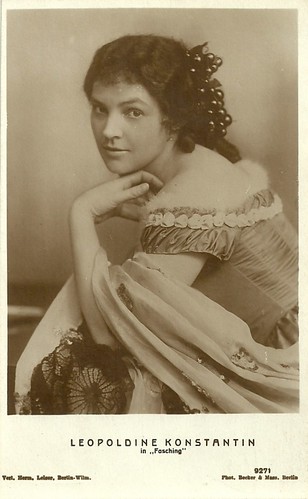
German postcard by Verlag Hermann Leiser, Berlin. Photo: Becker & Maass, Berlin. Publicity still for the play 'Fasching' (Carnival).
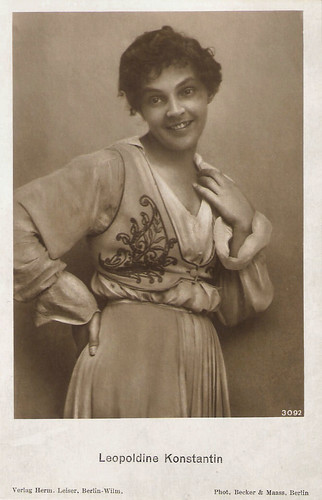
German postcard. by Verlag Hermann Leiser, Berlin. no. 3092. Photo: Becker & Maass, Berlin.
Leopoldine Eugenie Amelie Konstantin was born in Brünn, Austria-Hungary (now Brno, Czech Republic) in 1886. She took acting lessons at the acting school of the Deutsches Theater with Alexander Strakosch, whom she married shortly afterwards in 1906. They had one son, Alexander.
In 1907, she made her stage debut at the Kammerspielen in Berlin, connected to Max Reinhardt’s Deutsches Theater in Berlin. She acted in small parts in such plays as Frank Wedekind's 'Frühlings Erwachen' (Spring Awakening, 1907) and the William Shakespeare plays 'Romeo and Juliet' (1907), 'A Winter's Tale' (1908), and 'A Midsummer Night's Dream' (1910).
She attracted the attention of the critics for the first time when she played Maria opposite Friedrich Kayssler in the drama 'Gawân: ein Mysterium' (Gawan, 1910) by Eduard Stucken. That year, she also made her first film appearance as a dancer in Max Reinhardt’s early silent film of the exotic dance pantomime Sumurûn (1910), featuring Bertha Wiesenthal. Konstantin became known in the Berlin salons, and in 1912 she moved to the Deutsches Theater. After a lawsuit with Max Reinhardt, she changed to Vienna in 1916.
In the cinema she initially played roles in such short silent films as Europäisches Sklavenleben/European slave life (Emil Justitz, 1912) with Friedrich Zelnik, the adventure film Die Insel der Seligen/The Island of the Blessed (Max Reinhardt, 1913) and the crime film Der Onyxknopf/The Onyx Head (Joe May, Hans Oberländer, 1917) with Max Landa as the detective Joe Deebs.
One of her best-known performances during this period is her title role as Spanish dancer Lola Montez in the historical film Lola Montez (Robert Heymann, 1918) with Alfred Abel. After the First World War, she was offered increasingly minor parts, and she turned away from the cinema. In 1919 she returned to the Berlin stages. In 1923 she had a house built in Westerland for herself and her son Alexander. The following year, she divorced Strakosch and married Hungarian counsellor and author Géza Herczeg. She was very successful in the title role in Friedrich Schiller's 'Maria Stuart' (Mary Stuart) at the Volkstheater in Vienna in 1924. Another success was the play 'Finden Sie, dass sich Constanze richtig verhält?' (1928).
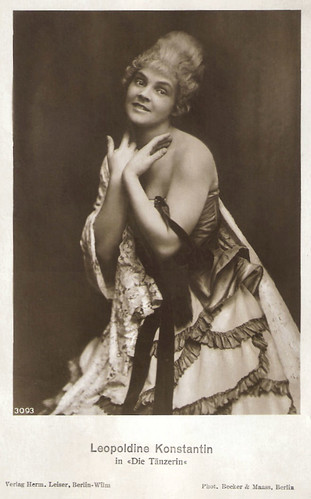
German postcard by Verlag Hermann Leiser, Berlin-Wilm., no. 3095. Photo: Becker & Maas, Berlin. Publicity still for Die Tänzerin/The Dancer (Georg Jacoby, 1915).
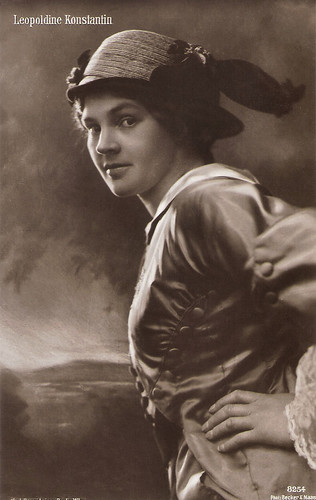
German postcard by Verlag Hermann Leiser, Berlin-Wilm., no. 8254. Photo: Becker & Maas, Berlin.
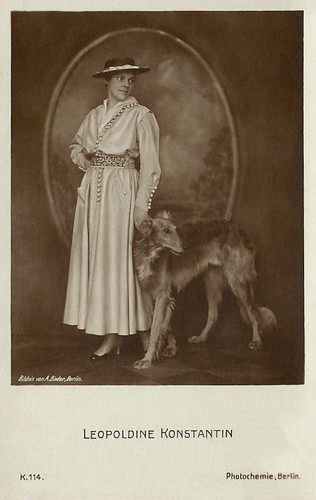
German postcard by Photochemie, Berlin, no. K. 114. Photo: Alex Binder, Berlin. Collection: Didier Hanson.
From 1933 Leopoldine Konstantin returned to film work. She played a supporting part in the musical comedy Saison in Kairo/Season in Cairo (Reinhold Schünzel, 1933) starring Renate Müller and Willy Fritsch. She appeared at the side of Käthe von Nagy in the Ufa production Prinzessin Turandot/Princess Turandot (Gerhard Lamprecht, 1934).
Another success was the Prussian film Der alte und der junge König - Friedrichs des Grossen Jugend/The Old and the Young King (Hans Steinhoff, 1935) about the conflict between King Frederick William I of Prussia (Emil Jannings), loving only his army, and his young efficient son, who later became known as King Frederick the Great of Prussia (Werner Hinz). Konstantin played the queen, torn between her husband and son. In 1935 she followed her husband Geza Herczeg to Austria and played among other things in the film Andere Welt/Other World (Marc Allégret, Alfred Stöger, 1937) with Käthe Gold.
In Austria, she also made the comedy Csibi, der Fratz/A Precocious Girl (Max Neufeld, Richard Eichberg, 1934), featuring Franciska Gaal and Konstantin as Cisbi’s mother. The film was made by the German subsidiary of Universal Pictures. Because of the Nazi rise to power, Gaal and other Jewish filmmakers went to Austria and Hungary to work on a series of comedy films. After the Anschluss of Austria with Nazi Germany, Konstantin's family moved to Britain where she lost her son during the last German air raid on London in 1944. Shortly after that she and Herczeg divorced (some sources say they divorced in 1938). Then Konstantin went into exile in the United States. She spoke no English and had to take a job as a factory worker.
After intensive language study, she landed a supporting role in Alfred Hitchcock's film Notorious (1946). She played Nazi leader Claude Rains' dominant and cold mother, although she was only 3 years older than he. Wikipedia: “The final major casting decision was Mme. Sebastian, Alex's mother. The spidery, tyrannical Nazi matron demanded a stronger, older presence, and when attempts to obtain Ethel Barrymore and Mildred Natwick fell through, German actor Reinhold Schünzel suggested Leopoldine Konstantin (…). Notorious was Konstantin's only American film appearance and one of the unforgettable portraits in Hitchcock's films.”
On-screen, Konstantin next only played small parts in a few American television series. IMDb quotes her about her role in Notorious (1946) and why she did not pursue further work in Hollywood: “My very first part and they made me in this monster!” In 1948 she returned to Vienna with her adopted daughter Elisabeth Herczeg, but she couldn't go on from her earlier successes. Her last acting work involved sporadic theatre roles and poetry readings on the radio. Leopoldine Konstantin died in Hietzing near Vienna in 1965. She was 79.

German collectors card in the series 'Vom Werden deutscher Filmkunst - Der Tonfilm', album no. 11, picture no. 93, group 44. Photo: Ufa / Ross Verlag. Leopoldine Konstantin and Gustav Waldau in Saison in Kairo/Cairo Season (Reinhold Schünzel, 1933).

German postcard by Ross Verlag, no. 184/4. Photo: Ufa. Willy Fritsch, Leopoldine Konstantin, Renate Müller and Gustav Waldau in Saison in Kairo/Cairo Season (Reinhold Schünzel, 1933).
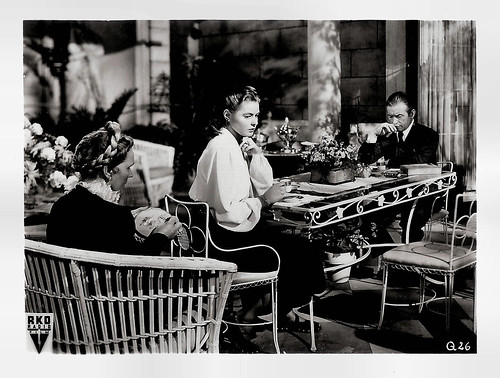
German collectors card. Photo: RKO Radio Film. Publicity still for Notorious (Alfred Hitchcock, 1946) with Ingrid Bergman, Claude Rains and Leopoldine Konstantin.
Sources: Stephanie D’heil (Steffi-Line, German), Thomas Staedeli (Cyranos), Wikipedia (English and German), and IMDb.
This post was last updated on 1 January 2025.

German postcard by Verlag Hermann Leiser, no. 4310. Photo: Becker & Maass. Collection: Didier Hanson. Publicity still for Sumurûn (Max Reinhardt, 1910).

German postcard by Verlag Hermann Leiser, Berlin. Photo: Becker & Maass, Berlin. Publicity still for the play 'Fasching' (Carnival).

German postcard. by Verlag Hermann Leiser, Berlin. no. 3092. Photo: Becker & Maass, Berlin.
Max Reinhardt
Leopoldine Eugenie Amelie Konstantin was born in Brünn, Austria-Hungary (now Brno, Czech Republic) in 1886. She took acting lessons at the acting school of the Deutsches Theater with Alexander Strakosch, whom she married shortly afterwards in 1906. They had one son, Alexander.
In 1907, she made her stage debut at the Kammerspielen in Berlin, connected to Max Reinhardt’s Deutsches Theater in Berlin. She acted in small parts in such plays as Frank Wedekind's 'Frühlings Erwachen' (Spring Awakening, 1907) and the William Shakespeare plays 'Romeo and Juliet' (1907), 'A Winter's Tale' (1908), and 'A Midsummer Night's Dream' (1910).
She attracted the attention of the critics for the first time when she played Maria opposite Friedrich Kayssler in the drama 'Gawân: ein Mysterium' (Gawan, 1910) by Eduard Stucken. That year, she also made her first film appearance as a dancer in Max Reinhardt’s early silent film of the exotic dance pantomime Sumurûn (1910), featuring Bertha Wiesenthal. Konstantin became known in the Berlin salons, and in 1912 she moved to the Deutsches Theater. After a lawsuit with Max Reinhardt, she changed to Vienna in 1916.
In the cinema she initially played roles in such short silent films as Europäisches Sklavenleben/European slave life (Emil Justitz, 1912) with Friedrich Zelnik, the adventure film Die Insel der Seligen/The Island of the Blessed (Max Reinhardt, 1913) and the crime film Der Onyxknopf/The Onyx Head (Joe May, Hans Oberländer, 1917) with Max Landa as the detective Joe Deebs.
One of her best-known performances during this period is her title role as Spanish dancer Lola Montez in the historical film Lola Montez (Robert Heymann, 1918) with Alfred Abel. After the First World War, she was offered increasingly minor parts, and she turned away from the cinema. In 1919 she returned to the Berlin stages. In 1923 she had a house built in Westerland for herself and her son Alexander. The following year, she divorced Strakosch and married Hungarian counsellor and author Géza Herczeg. She was very successful in the title role in Friedrich Schiller's 'Maria Stuart' (Mary Stuart) at the Volkstheater in Vienna in 1924. Another success was the play 'Finden Sie, dass sich Constanze richtig verhält?' (1928).

German postcard by Verlag Hermann Leiser, Berlin-Wilm., no. 3095. Photo: Becker & Maas, Berlin. Publicity still for Die Tänzerin/The Dancer (Georg Jacoby, 1915).

German postcard by Verlag Hermann Leiser, Berlin-Wilm., no. 8254. Photo: Becker & Maas, Berlin.

German postcard by Photochemie, Berlin, no. K. 114. Photo: Alex Binder, Berlin. Collection: Didier Hanson.
Spidery, tyrannical Nazi matron
From 1933 Leopoldine Konstantin returned to film work. She played a supporting part in the musical comedy Saison in Kairo/Season in Cairo (Reinhold Schünzel, 1933) starring Renate Müller and Willy Fritsch. She appeared at the side of Käthe von Nagy in the Ufa production Prinzessin Turandot/Princess Turandot (Gerhard Lamprecht, 1934).
Another success was the Prussian film Der alte und der junge König - Friedrichs des Grossen Jugend/The Old and the Young King (Hans Steinhoff, 1935) about the conflict between King Frederick William I of Prussia (Emil Jannings), loving only his army, and his young efficient son, who later became known as King Frederick the Great of Prussia (Werner Hinz). Konstantin played the queen, torn between her husband and son. In 1935 she followed her husband Geza Herczeg to Austria and played among other things in the film Andere Welt/Other World (Marc Allégret, Alfred Stöger, 1937) with Käthe Gold.
In Austria, she also made the comedy Csibi, der Fratz/A Precocious Girl (Max Neufeld, Richard Eichberg, 1934), featuring Franciska Gaal and Konstantin as Cisbi’s mother. The film was made by the German subsidiary of Universal Pictures. Because of the Nazi rise to power, Gaal and other Jewish filmmakers went to Austria and Hungary to work on a series of comedy films. After the Anschluss of Austria with Nazi Germany, Konstantin's family moved to Britain where she lost her son during the last German air raid on London in 1944. Shortly after that she and Herczeg divorced (some sources say they divorced in 1938). Then Konstantin went into exile in the United States. She spoke no English and had to take a job as a factory worker.
After intensive language study, she landed a supporting role in Alfred Hitchcock's film Notorious (1946). She played Nazi leader Claude Rains' dominant and cold mother, although she was only 3 years older than he. Wikipedia: “The final major casting decision was Mme. Sebastian, Alex's mother. The spidery, tyrannical Nazi matron demanded a stronger, older presence, and when attempts to obtain Ethel Barrymore and Mildred Natwick fell through, German actor Reinhold Schünzel suggested Leopoldine Konstantin (…). Notorious was Konstantin's only American film appearance and one of the unforgettable portraits in Hitchcock's films.”
On-screen, Konstantin next only played small parts in a few American television series. IMDb quotes her about her role in Notorious (1946) and why she did not pursue further work in Hollywood: “My very first part and they made me in this monster!” In 1948 she returned to Vienna with her adopted daughter Elisabeth Herczeg, but she couldn't go on from her earlier successes. Her last acting work involved sporadic theatre roles and poetry readings on the radio. Leopoldine Konstantin died in Hietzing near Vienna in 1965. She was 79.

German collectors card in the series 'Vom Werden deutscher Filmkunst - Der Tonfilm', album no. 11, picture no. 93, group 44. Photo: Ufa / Ross Verlag. Leopoldine Konstantin and Gustav Waldau in Saison in Kairo/Cairo Season (Reinhold Schünzel, 1933).

German postcard by Ross Verlag, no. 184/4. Photo: Ufa. Willy Fritsch, Leopoldine Konstantin, Renate Müller and Gustav Waldau in Saison in Kairo/Cairo Season (Reinhold Schünzel, 1933).

German collectors card. Photo: RKO Radio Film. Publicity still for Notorious (Alfred Hitchcock, 1946) with Ingrid Bergman, Claude Rains and Leopoldine Konstantin.
Sources: Stephanie D’heil (Steffi-Line, German), Thomas Staedeli (Cyranos), Wikipedia (English and German), and IMDb.
This post was last updated on 1 January 2025.
No comments:
Post a Comment